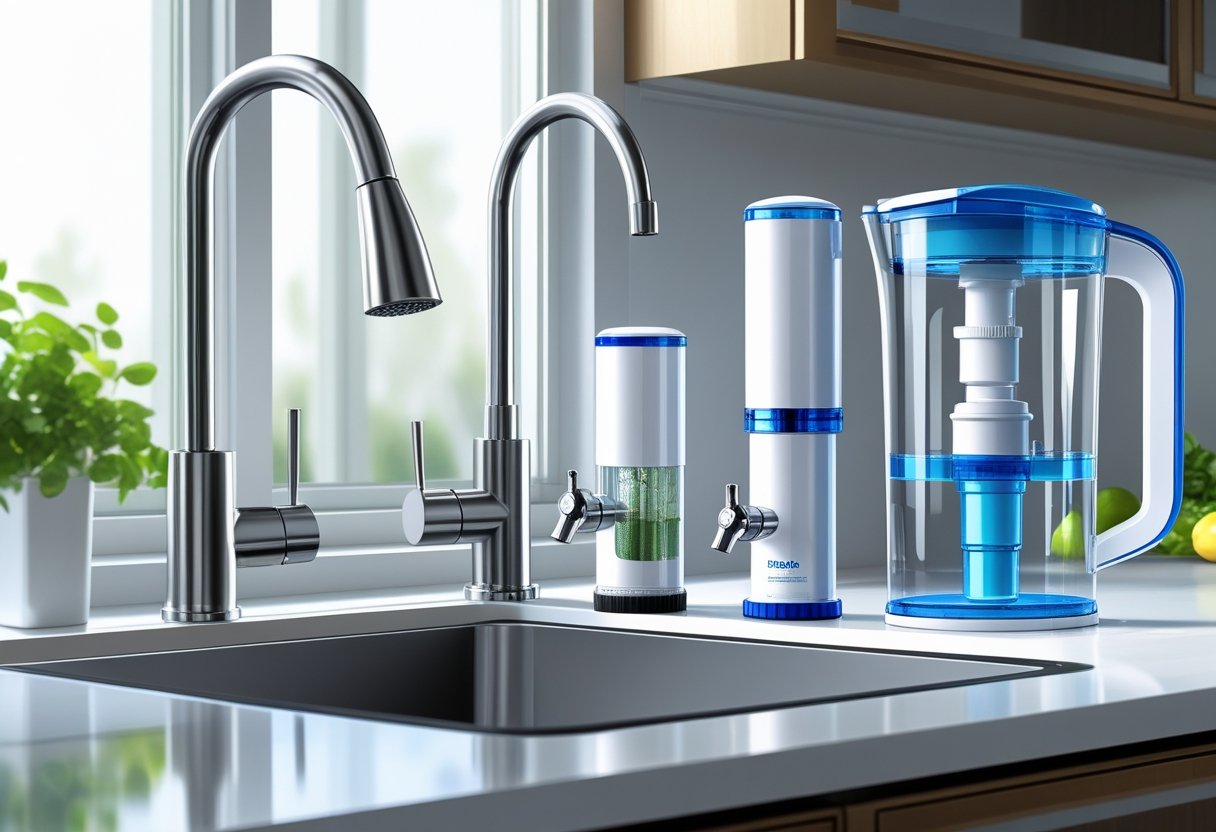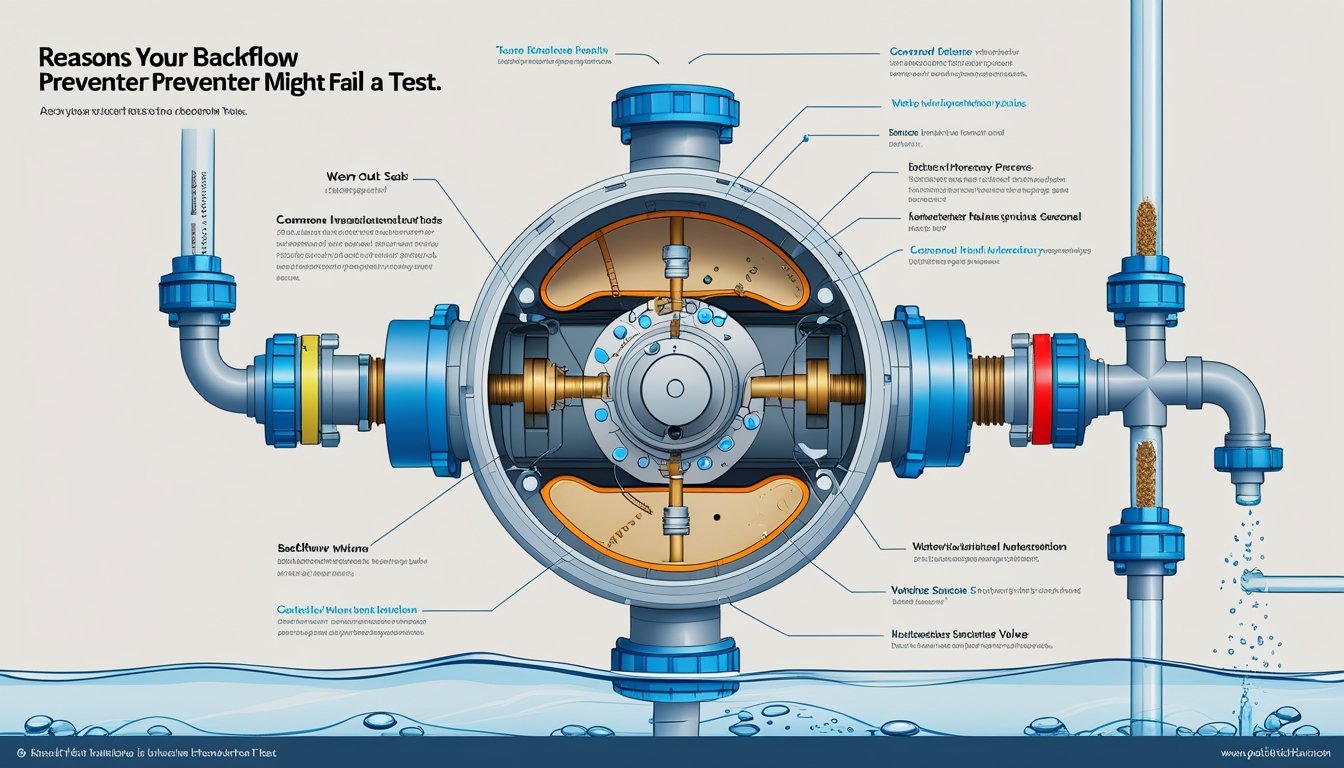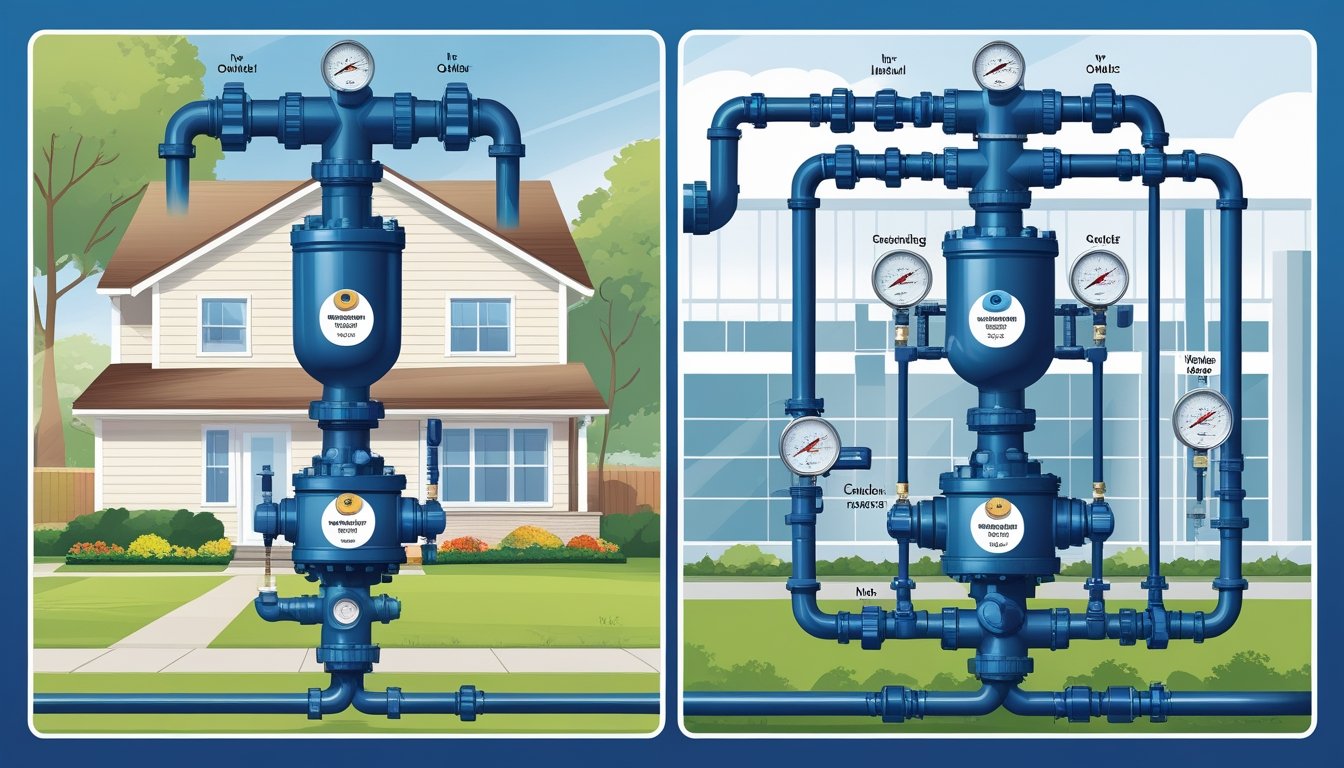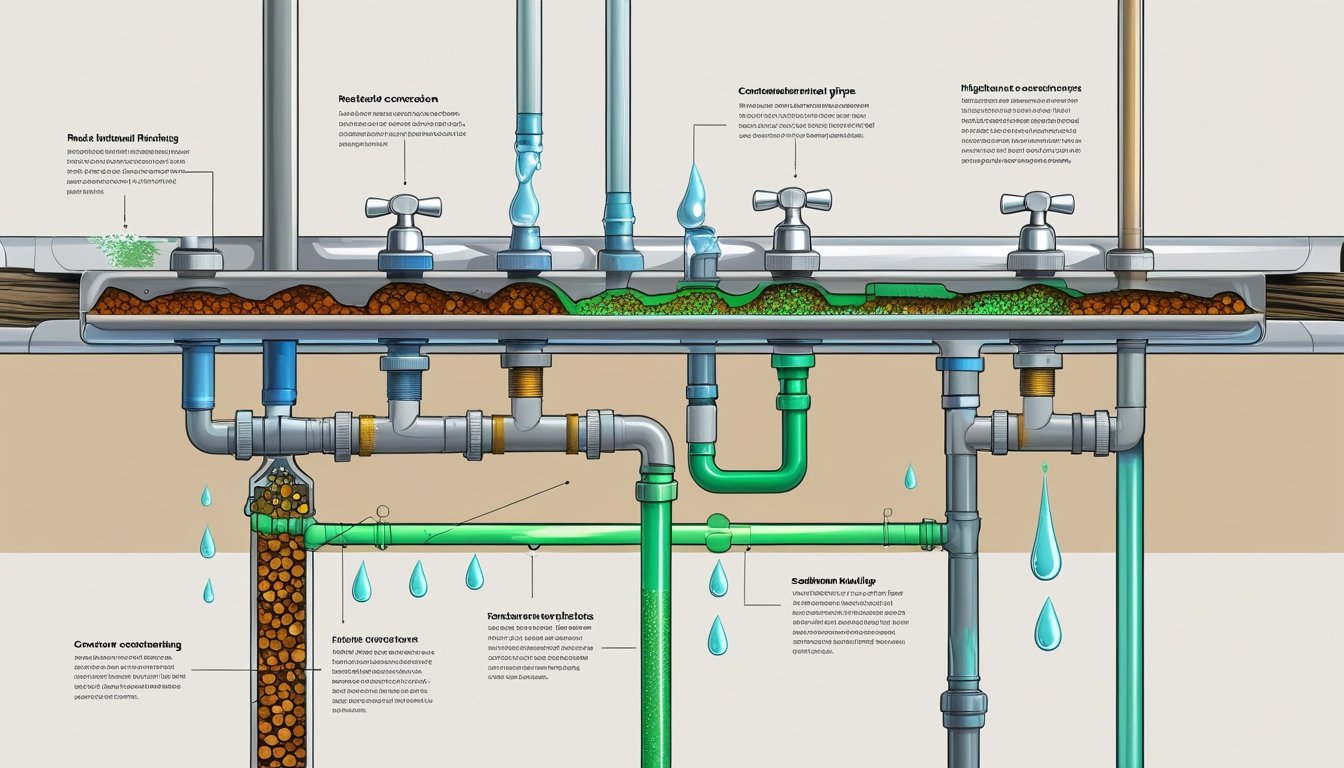When considering the best faucet water filters for your home, you might be overwhelmed by the choices available. Identifying the right faucet water filter can significantly improve the quality of your drinking water by effectively removing contaminants like chlorine and lead. Investing in a reliable faucet water filter not only enhances the taste of your tap water but also provides peace of mind for you and your family.
In this article, you'll discover essential tips to select the best faucet water filter that meets your specific needs. We’ll explore various options tailored to different budgets and lifestyles, ensuring you find a solution that works seamlessly in your kitchen. Properly filtered water can make a noticeable difference, and with our guidance, you can make an informed decision for your home.
At Pacific Backflow, we understand the importance of clean water, ensuring your home benefits from safe and reliable drinking water. Whether you have questions about installation or maintenance, we’re here to support you in achieving optimal water quality in your household.
How Faucet Water Filters Work
Faucet water filters offer a practical solution for improving the quality of your drinking water. Understanding their functionality is essential for making an informed choice. Below are key aspects of how these filters operate.
Filtration Technology and Processes
Faucet water filters utilize various technologies to purify drinking water. Common methods include activated carbon, reverse osmosis, and ceramic filtration.
- Activated Carbon: This is the most prevalent technology. It absorbs impurities, such as pesticides and chlorine, enhancing the taste and odor of the water.
- Reverse Osmosis (RO): This process forces water through a semipermeable membrane, effectively removing harmful contaminants like heavy metals and bacteria.
- Ceramic Filters: These filters use a porous ceramic material to block pathogens and sediment while allowing clean water to flow through.
Each technology has its merits, and selecting the right one depends on your specific water quality needs.
Contaminant Removal Capabilities
Faucet water filters are designed to target various water contaminants. These include:
- Chlorine: Often used in municipal water treatment, chlorine can affect taste and odor; filters significantly reduce its presence.
- Lead: Found in older plumbing, lead can be harmful, especially for children. Quality filters can remove over 99% of lead content.
- Sediments and Particulates: These may include rust, dirt, and silt. Most faucet filters efficiently capture these, ensuring clearer water.
Some advanced filters also remove pharmaceuticals and other contaminants. Evaluating the filter's specifications helps you understand what it can remove effectively.
Filtered Water vs. Unfiltered Tap Water
The comparison between filtered and unfiltered water demonstrates significant differences.
- Quality: Filtered water is cleaner and has fewer contaminants, making it healthier for consumption. This can translate to better taste and odor.
- Safety: Using a faucet water filter reduces exposure to harmful substances, such as lead and chlorine, which can have long-term health effects.
- Cost-effectiveness: While purchasing filters entails an upfront cost, the long-term savings on bottled water and health benefits often justify the investment.
Using a reliable service like Pacific Backflow can ensure your water system is protected and functioning optimally, further contributing to clean and safe drinking water.
Types of Faucet Water Filters
Understanding the various types of faucet water filters is essential for choosing the right one for your needs. Each type has distinct features and filtering capabilities, designed to enhance your water quality in different ways.
Faucet-Mounted Water Filters
Faucet-mounted water filters attach directly to your tap for convenient and immediate access to filtered water. These filters typically use activated carbon or other filtration media to reduce contaminants like chlorine, lead, and sediment. They're easy to install, usually requiring no tools, making them ideal for renters or anyone seeking a quick solution.
You can find models offering a switch to toggle between filtered and unfiltered water, which adds versatility. Some models, like the Pur Advanced, are designed to eliminate numerous contaminants while being user-friendly. These filters can effectively improve the taste of tap water, providing you with a better drinking experience.
Under-Sink Filters
Under-sink filters offer a more permanent solution by integrating into your plumbing and providing filtered water through a dedicated faucet. These systems typically utilize multiple stages of filtration, including reverse osmosis, enhancing the removal of harmful substances.
They are beneficial for those looking for comprehensive filtration, as they often remove various contaminants, including heavy metals and microbes. Maintenance is essential; regularly changing the filter cartridges ensures optimal performance. This type of filter is an excellent choice if you want cleaner water without impacting your kitchen space.
Water Filter Pitchers
Water filter pitchers are portable and easy to use, making them a popular choice among consumers. These pitchers contain a built-in filter that reduces contaminants through gravity filtration. While they require occasional manual refilling, they are cost-effective and don’t involve installation.
Most pitcher filters can effectively reduce chlorine taste and odor, along with heavy metals like lead. They are convenient for smaller households or those with less frequent water consumption. Remember to keep track of filter replacement schedules as performance can vary based on usage and water quality.
Mineral Core Filter Systems
Mineral core filter systems provide an innovative approach to water filtration by incorporating mineralization processes. These filters not only remove impurities but also infuse beneficial minerals back into the water. This improvement enhances taste and provides some mineral content that can be beneficial to health.
Such systems typically operate with a multi-stage filtration method, first removing contaminants and then reintroducing minerals. They may require more upkeep than standard filters, but the taste and quality they deliver can be worth the investment for health-conscious consumers.
Selecting the right faucet water filter depends on your specific needs, space, and lifestyle. If you require expert guidance on backflow services or plumbing systems in your area, consider reaching out to Pacific Backflow for reliable assistance.
Key Features to Consider
When selecting a faucet water filter for your home, several critical features can influence your decision. These include flow rate and water pressure, filter life and replacement requirements, certifications that demonstrate quality, and ease of installation. Understanding these factors will help you make an informed choice.
Flow Rate and Water Pressure
Flow rate is a key factor in how quickly you can fill containers with filtered water. Most faucet filters have a flow rate between 0.5 to 2.0 gallons per minute (GPM). Choosing a filter with a higher flow rate can enhance convenience, but it should not compromise the filter's ability to purify water effectively.
Also, consider your existing water pressure. Low water pressure may affect the filter's performance, making it less efficient. Therefore, check the specifications and test your water pressure to ensure compatibility with your chosen filter.
Filter Life and Replacement
The lifespan of a filter can vary significantly from one model to another. Generally, many faucet filters need replacement every 2 to 6 months, depending on usage and water quality. A filter that lasts longer can save you time and money.
Before making a purchase, check how often you will need to replace the filter. Many filters indicate lifespan in gallons, so assess how much water you consume to estimate your replacement frequency accurately. Be aware of the maintenance requirements to keep your system functioning well.
NSF/ANSI Certifications and Standards
Look for faucets that carry NSF/ANSI certifications, such as NSF 42, which verifies that the filter removes certain contaminants effectively. These certifications ensure that a product meets specific safety and performance standards.
Understanding which contaminants are reduced by the filter is vital for assessing its effectiveness. Filters with NSF/ANSI 53 certification are preferred if you need to remove lead or other harmful substances. Always check the certification details before making a decision.
Ease of Installation and Compatibility
Installation should be straightforward, and you want a model compatible with your faucet type. Most faucet water filters can be installed without tools, making for a quick setup. Some designs feature a detachable mount that easily connects to your faucet.
Before purchasing, verify that the filter fits your specific faucet type, whether you have a pull-down, pull-out, or standard faucet. Read customer reviews to gauge installation experiences and any potential challenges others have faced.
By considering these features, you can select a faucet water filter that suits your needs effectively.
Top-Rated Faucet Water Filters for Home
When considering the best faucet water filters for your home, a few key options stand out due to their performance and customer satisfaction. These filters not only improve water taste but also effectively reduce contaminants, ensuring safe drinking water for you and your family.
Brita Complete Faucet Filtration System
The Brita Complete Faucet Filtration System is designed for easy installation and convenience. It connects directly to your faucet, enabling a quick switch between filtered and unfiltered water. This system effectively reduces contaminants such as chlorine, lead, and sediment, providing cleaner drinking water.
- Filter Lifespan: Each filter can last up to 100 gallons, which means less frequent replacements.
- Ease of Use: The filter indicator alerts you when it’s time to replace the cartridge.
- Taste Improvement: Users report a significant improvement in taste, making it a popular choice for households.
You can explore more about this option through Brita's product page.
PUR Plus Faucet Filtration System
Another excellent choice is the PUR Plus Faucet Filtration System. Known for its powerful filtration capabilities, it removes over 70 contaminants, including lead and certain pesticides, making it a reliable option for health-conscious consumers.
- Advanced Filtration Technology: Features a unique patented filter that enhances water quality.
- Filter Replacement: Filters typically last up to 100 gallons or around 2-3 months, depending on usage.
- Ease of Installation: Designed to fit most faucets without the need for additional tools.
This system prioritizes both health and usability, making it suitable for your family's needs. Learn more about this filter on Consumer Reports.
ZeroWater ExtremeLife Faucet Mount Water Filter
The ZeroWater ExtremeLife Faucet Mount Water Filter is known for reducing total dissolved solids (TDS) to zero, providing pure, great-tasting water. Its five-stage filtration system targets heavy metals, chlorine, and other impurities, ensuring optimal water quality.
- TDS Meter: Included with the filter, this meter helps you track the quality of your water.
- Long-lasting Filters: Designed to provide superior filtration performance, with filters lasting longer than many competitors.
- Versatile Fit: The filter is compatible with various faucet types, ensuring a seamless fit.
This ensures you receive the highest quality of drinking water possible for you and your family. More details can be found at ZeroWater's site.
Consider these top-rated options when choosing a faucet water filter for your home. Should you encounter any backflow issues related to your drinking water supply, Pacific Backflow is here to assist with reliable and responsive backflow testing and services in San Diego County.
Maintenance and Longevity
Proper maintenance is essential for ensuring your faucet water filter operates effectively and lasts longer. Regular monitoring and timely replacements can save you from more significant issues down the line.
Filter Replacement Schedules
Filter lifespan varies based on water quality and usage. Typically, most faucet water filters require replacement every 2 to 6 months or after filtering approximately 100 to 500 gallons, as seen in user guides.
To keep track, consider creating a schedule. Here’s a simple chart for your reference:
Filter TypeReplacement IntervalStandard Filters2-3 monthsAdvanced Filters4-6 months
Always check the manufacturer's recommendations. Remember, waiting too long can compromise water quality, making replacements critical for maintaining optimal performance.
Common Issues and Troubleshooting
Even with regular maintenance, issues may arise. Here are some common problems and solutions:
- Reduced Water Flow: This could be due to a clogged filter. Replace the filter as indicated in your schedule.
- Unpleasant Taste or Odor: If you notice changes, it may signal that the filter is no longer effective. Immediate replacement is required.
- Leakage: Check for proper installation. If the filter is secure and leaks persist, inspect the filter for damage.
For additional peace of mind, Pacific Backflow provides comprehensive backflow services to ensure your entire system functions properly, safeguarding your water supply in San Diego County. Regular testing and maintenance can help prevent bigger issues before they arise.
Comparing Faucet Water Filters to Other Filtration Solutions
Faucet-mounted water filters offer a convenient way to ensure you have access to clean drinking water. To determine if they are the right choice for you, it's essential to compare them with other popular filtration solutions like pitcher filters and under-sink filters.
Faucet-Mounted Filters vs. Pitcher Filters
Faucet-mounted filters provide continuous access to filtered water directly from your tap, unlike pitcher filters, which require manual filling and time for the water to filter through. This difference makes faucet filters more suitable for those who frequently use water for cooking or drinking.
In terms of filtration capability, faucet-mounted water filters often have a higher capacity for removing contaminants. For example, many are designed to eliminate chlorine, lead, and other harmful substances effectively. Additionally, faucet filters generally have a longer lifespan than pitcher filters, reducing the frequency of replacements.
On the downside, while pitcher filters are portable and space-saving, they can fall short in filtration efficiency. If you’re looking for constant access to clean water, a faucet-mounted solution may be the superior choice.
Faucet-Mounted Filters vs. Under-Sink Filters
Under-sink filters typically offer a more comprehensive filtration system that is built into your plumbing, providing high-quality water. They tend to filter a wider variety of contaminants than faucet-mounted filters. Installation can be more complex, while faucet-mounted filters are designed for easy installation without the need for additional plumbing work.
However, under-sink filters can be more expensive due to installation costs and the need for periodic maintenance. On the other hand, faucet-mounted filters are often more budget-friendly and require less ongoing upkeep.
If you prioritize convenience and a lower initial cost, faucet-mounted filters stand out. If you want advanced filtration with higher capacity, an under-sink filter might be worth the investment. Each solution has its unique advantages, making it essential for you to consider your specific water needs.
Frequently Asked Questions
This section addresses common inquiries about faucet water filters, focusing on selection criteria, top-rated options, specific uses, and comparisons with other filtration systems. Understanding these points can help you make an informed decision for your home.
How do I choose the best faucet water filter for my home?
Selecting the right faucet water filter involves considering your specific needs. Evaluate the contaminants present in your water supply and determine what you want to eliminate.
Look for filters with certifications from organizations like NSF International or the Water Quality Association. These certifications ensure the filter has been tested and meets performance standards.
What are the top-rated faucet water filters according to consumer reports?
Consumer reports often highlight models that excel in contaminant removal and customer satisfaction. Some of the consistently top-rated brands include Pur and Brita.
Check recent reviews for updated rankings and performance insights to find the most effective options available.
Which faucet water filters are best for improving skin hydration?
While faucet water filters can remove certain contaminants that may affect skin health, they're not specifically designed for enhancing skin hydration. Look for filters that reduce chlorine and heavy metals, as these can lead to skin irritation.
Consult product specifications to ensure the filter targets the right contaminants that could affect your skin's health.
Can you list the most effective under-sink water filters for residential use?
Under-sink filters generally provide more comprehensive filtration compared to faucet-mounted options. Popular choices often mentioned include reverse osmosis systems and multi-stage filters.
Brands like APEC and iSpring are known for their efficiency and reliability in ensuring clean drinking water.
What should I look for in a water filter for my kitchen sink?
When choosing a water filter for your kitchen sink, assess your specific needs like filtration efficiency, installation ease, and maintenance requirements.
Consider features such as filter lifespan, contaminant reduction capabilities, and flow rate to ensure the filter meets your daily water needs.
Are there any countertop water filtration systems that outperform faucet filters?
Countertop filtration systems can offer enhanced filtration capabilities compared to faucet-mounted filters due to their larger size and advanced technologies.
Brands that receive positive feedback include Berkey and AquaTru, which are praised for their effectiveness in removing a wider range of contaminants.











